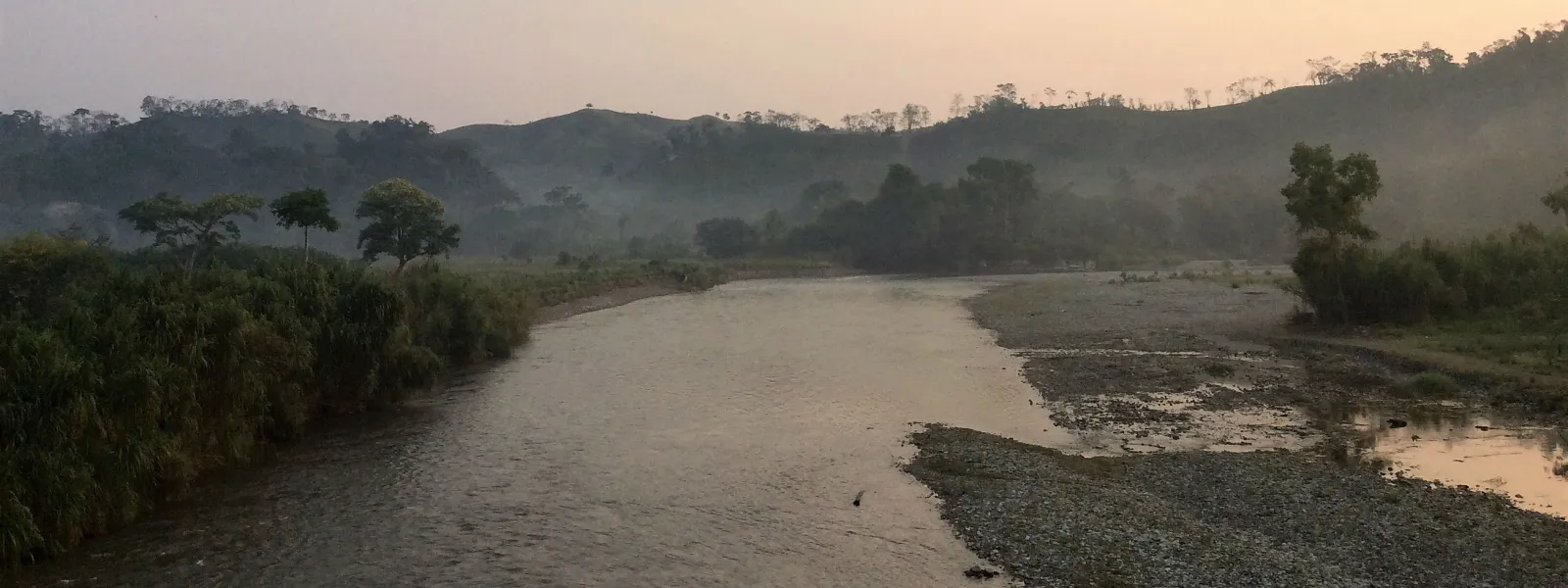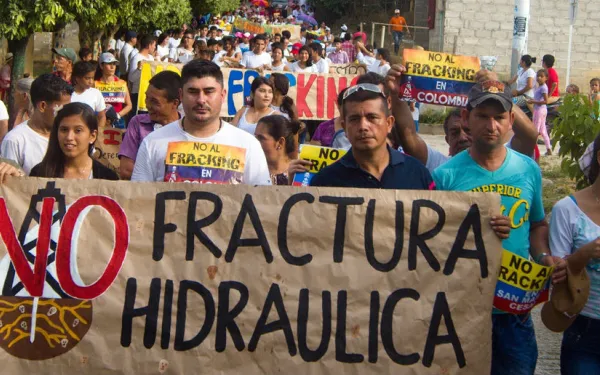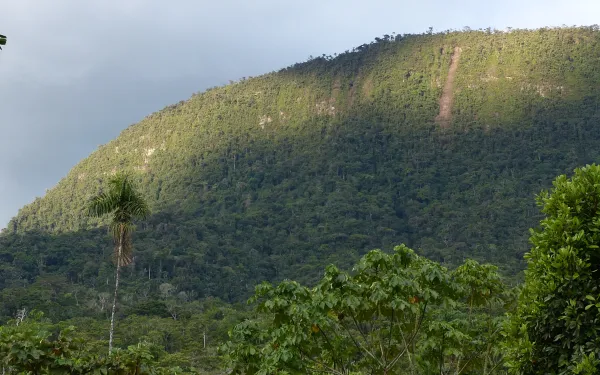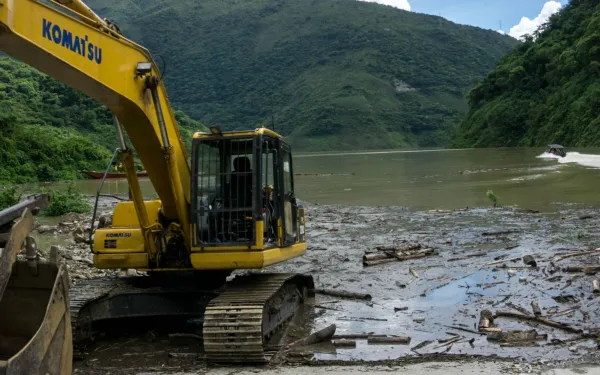
Project
Liliana Ávila /AIDAMayan women’s struggle before the Inter-American Development Bank in Guatemala
Mayan communities succeeded in getting the IDB Invest to develop a responsible exit plan after withdrawing its financing for two hydroelectric projects that negatively impacted ecosystems and the livelihoods of indigenous peoples, especially women, in the micro-region of Yichk'isis (Ixquisis).
In the struggle to defend their water, territory and way of life, indigenous Mayan communities in the Yichk'isis (Ixquisis) micro-region of northern Guatemala convinced the Inter-American Development Bank Group to withdraw its financing of two hydroelectric dams whose implementation violated their rights. The decision was also significant in that the IDB, for the first time, designed a responsible exit plan.
That historic advance was the result of the complaint that the communities filed in August 2018—with the support of AIDA, the Plurinational Ancestral Government of the Akateko, Chuj, and Q'anjob'al Native Nations, and the International Platform against Impunity. The complaint was filed with the Independent Consultation and Investigation Mechanism (MICI), the IDB Group's accountability office.
In resolving the case in September 2021, the MICI concluded that IDB Invest failed to comply with its own operational policies and safeguards, in the framework of the financing granted to the company Energía y Renovación S.A. for the implementation of the San Mateo and San Andrés hydroelectric projects.
Learn more about this achievement
In the mountains of Northwestern Guatemala, near the border with Mexico, the land is rich and fertile. Several important rivers and many other water sources feed the soil.
The residents of these mountains, many indigenous women of Mayan descent, have long depended on the waters to nourish them, to provide them with fish, as well as for agriculture, sanitation, and cooking.
But the construction of the San Mateo and San Andres dams has caused water scarcity and the contamination of rivers and other natural resources long cherished by the communities.
The near lack of water has also drastically reduced harvests, lessening the income gained from selling corn, wheat, beans, coffee, sugar cane and other products in the market. As a result, the conditions of poverty in the area have deepened.
And the risk situation is profound, particularly for women, who have played a very important role in the defense of water and territory threatened by hydroelectric projects, and are therefore victims of intimidation and stigmatization.
As guardians of their land and water, they have come to its defense and they’ll continue to prevent environmental deterioration from further harming their families.
Read our fact sheet on the case

Related projects

State Council maintains suspension of fracking in Colombia
We are proud to be part of the litigation in which this decision occured and hope that the high court will continue to prioritize the precautionary principle and consider the risks of harm that fracking poses to the environment and human health. Bogotá, Colombia. In response to an action filed by the Public Interest Legal Clinic of the Universidad del Norte, Colombia's State Council maintained the provisional suspension of the exploration and exploitation of non-conventional hydrocarbon deposits through hydraulic fracturing. This means that fracking continues to be suspended in Colombia, that it is currently illegal to carry it out, and that Colombia is in the midst of a moratorium on fracking by court order. With its decision, the State Council, a Colombian High Court, rejected the government's request, which sought to lift the suspension that has been in force since last November and give free rein to fracking in the country. AIDA celebrates the State Council's decision and we feel very honored to be part of this litigation. It is undoubtedly a step in the right direction given the high degree of uncertainty about the risks associated with fracking. These include: air pollution, the contamination of surface and groundwater sources, damages to human health, and emissions of methane—a potent greenhouse gas and one of the main aggravators of the climate crisis facing the world. In this scenario, the urgency of moving towards clean energy is evident. The high court concluded that the precautionary principle should be applied because, even without absolute scientific certainty, there is minimal evidence of potential damage resulting from an apparent deficiency in the measures contemplated in the regulation of fracking. Colombia today aims to be an example for Latin America. The provisional suspension of the regulation corresponds to a precautionary measure while the case is definitively resolved. It is essential that the State Council continue to give priority to the precautionary principle, taking into account the lack of full certainty about the risks of irreversible damage that fracking implies for the environment, the climate and for people. At AIDA, we welcome judicial independence, because it is fundamental for the legal protection of the environment. We hope that the ongoing judicial process will properly consider the evidence and arguments presented, including those related to an increasingly urgent task: the fight against the climate crisis. PRESS CONTACT: Victor Quintanilla (Mexico), AIDA, [email protected], +5215570522107
Read more
Ecuador bets on a mining boom, at the expense of nature
In southeast Ecuador, in the heart of its Amazon, stands an imposing mountain massif that stretches more than 160 kilometers in length: the Condor Mountain Range, which, once largely unknown, retains an expansive intact and unexplored territory. In this area of vital importance for life, science and conservation, an open-pit copper mine known as the Mirador project, with an expected lifespan of 30 years, began operating in July. The launch of the project marks the beginning of large-scale mining in Ecuador, with which the government intends to sustain the economy and leave behind its dependence on oil. This is a sad novelty because large-scale mining involves the risk of enormous environmental damages, which are most serious in ecosystems of great biodiversity and proximity to water sources such as the Condor Range, where indigenous and peasant communities also live. This impulse toward extractive activity contradicts the progress made in 2008, when Ecuador was the first country in the world to recognize the rights of nature in its Constitution. As the Amazon burns in flames, and takes our future with it, Ecuador has a responsibility to change course. The nation must serve as an example for other countries of the Amazon Basin, and the world, of the effective protection of the rainforest and those who depend on it. The resources we must conserve "This country lacks resources." Based on these words, the Mirador project and the presence of the mining industry in Ecuador has been intensified without precedent. They were said by spokespersons of the Chinese company Ecuacorriente (in charge of the mining concession) and echoed, in turn, by government representatives. But what will happen to the biodiversity and environmental services of the priceless Condor Range? These Amazonian mountains protect cloud forests and páramos (high mountain wetlands), both natural carbon sinks. They are home to more than 2,000 species of flora, including one of the few carnivorous plants in Ecuador, and hosts 613 species of birds. According to studies, there are another 2,000 plant species to be discovered in this unique environment. It is there that excavations of 300 to 500 meters deep will be carried out to access subsoil minerals, and where risky dams will be built to deposit tons of waste. The damages are already occurring. The company confirmed that 1,422 hectares of forest have been cleared for the project. And local organizations have denounced serious legal and constitutional violations surrounding the project. The discourse of large profits in store for the country from the exploitation and sale of subsoil resources has gained strength in recent months. Official data shows that currently 7.5% of the territory is concessioned for mineral exploration, and the government is analyzing the granting of new concessions. By 2020, the government plans to have a map of the new areas where mining will be permitted. These plans ignore the perpetual impacts of large-scale mining, including impacts on the landscape and damage to water quality. In the case of Mirador, the project has already caused the diversion of the Tundayme River, just to name one of its impacts, recognized as irreversible by the company itself. "Be coherent, stop using cell phones and bicycles and other objects made from materials extracted from the mines," challenged Vice President Otto Sonnenholzner, one of mining's biggest promoters, to those who oppose the projects. "I propose another challenge: you stop using water and food," replied Yaku Perez, a defender of water and prefect of the province of Azuay. The above is the clearest metaphor of what is at stake with the blind advance of open-pit mining in Ecuador. The climate crisis demands a new vision of development The accelerated move towards large-scale mining in Ecuador means acting negligently in the face of the global climate crisis, which forces us to change our development model this decade in order to achieve the goals of mitigation and adaptation. The international scientific community warned in 2018 that we only have a dozen years to maintain global warming at a maximum of 1.5°C (with respect to the pre-industrial era) and that exceeding that limit would make the risks of droughts, floods and extreme heat worse. This requires unprecedented transitions in sectors such as energy and industrial systems. Boosting large-scale mining is reversing and deepening the development model that has caused the climate emergency. It means destroying natural carbon sinks such as those in the Condor Mountain Range and the Amazon as a whole. Ecuador can and must take a new step forward. It must, as it did in 2008 with the recognition of the rights of nature, find a development model that effectively respects its obligations to the climate and to human rights. Ecuador cannot continue to mortgage the present and future of entire communities and ecosystems under the pretext of the immediate and ephemeral profits of mining. New paths are possible and, above all, urgent.
Read more
Inter-American Development Bank washes its hands of responsibility for dangerous Hidroituango dam and related human rights violations in Colombia
Fearing imminent collapse of the dam, communities in Antioquia, Colombia, have learned that the public lending arm of the Inter-American Development Bank (IDB) will not be investigated. Washington, DC — Last month, the Board and management of the Inter-American Development Bank (IDB) announced it would not approve an investigation of the Bank’s role in financing the construction of the controversial Ituango Hydroelectric Project (Hidroituango) in Colombia. The decision disregards allegations of acute and far-reaching harms caused by the project, including a humanitarian crisis that has displaced hundreds of families and caused human rights abuses, including assassination and intimidation of community members who oppose the project. The announcement comes more than a year after communities affected by the construction of the Hidroituango dam on the Cauca River in Antioquia, Colombia, filed a claim with the Independent Consultation and Investigation Mechanism (MICI). The claim, signed by more than 400 individuals affected by the dam, sought recourse from the MICI for the IDB’s alleged failure to comply with its own environmental and social safeguards. "We publicly denounce the IDB’s decision to evade its responsibility for the environmental damage and human rights violations resulting from the Hidroituango project, and we condemn the role of the MICI in facilitating and manifestly supporting this decision,2 remarked Isabel Zuleta, representative of Movimiento Ríos Vivos Antioquia. "It is unconscionable that the IDB is attempting to rewrite history by absolving itself from its responsibility for enabling and financing high-risk development projects that have extreme environmental impacts and blatantly violate human rights," added Zuleta. The IDB has two lending arms, one that invests in the public sector (the IDB) and another that invests in the private sector (IDB Invest). The MICI is the accountability mechanism of the bank, in charge of evaluating environmental and social compliance of the institution’s investments. The IDB initially invested in the Hidroituango project in 2012, which paved the way for and facilitated millions of dollars of additional investments from the IDB, as well as an additional billion from other international banks. The MICI, whose mandate is to provide accountability for harms caused by IDB investments, recommended no investigation of the IDB’s role in the project. Despite the decision not to review the IDB’s compliance, the MICI could continue its investigation regarding IDB Invest’s investment in the Hidroituango project. However this will depend completely on approval by the Bank’s Board. Before the dam was approved, communities warned of precisely the environmental and social impacts that have occurred. "For an institution that seeks to improve the lives of people in Latin America, the IDB’s decision is absurd, irresponsible, and disrespectful. It exemplifies a complete disregard for people living within the Cauca River Basin. Unfortunately, this disregard too often characterizes the IDB’s engagement in large-scale infrastructure projects throughout the region," said Alexandre Andrade Sampaio of International Accountability Project. "What is the value of environmental and social policies at the IDB, when they are ignored and dismissed precisely when they are most needed to protect people’s lives? This lack of accountability is unacceptable, and it demonstrates why communities affected by the actions of development banks have found it necessary to resort to the courts to secure their rights," remarked Carla García Zendejas, Senior Attorney at the Center for International Environmental Law (CIEL), in reference to the recent US Supreme Court decision in Jam v. IFC, which recognized that international organizations such as the IDB are not immune from litigation in US courts. "This decision exemplifies the perils of an accountability mechanism that lacks the independence and legitimacy to initiate and carry out a genuine investigation of a bank’s projects," added García Zendejas. "Since day one, the Hidroituango project carried out a weak impact assessment, inaccurate surveys of affected people and deficient environmental implementation and monitoring, but the IDB has continued to invest in it," sustained Carlos Lozano, Senior Attorney at the Interamerican Association for Environmental Defense (AIDA). "The project was approved and is under construction without having previously carried out an evaluation of alternatives," he pointed out. Members of Movimiento Ríos Vivos Antioquia, who represent affected communities in the complaint, continue to receive ongoing threats and suffer intimidation, homicides, and other forms of violence. The IDB has shown its disregard for the volatile situation surrounding Hidroituango, including the continued presence of paramilitary groups in the area. The IDB has also ignored community requests to delay dam construction to exhume mass graves from the armed conflict in the area affected by the dam. Press Contacts: Isabel Zuleta, Movimiento Ríos Vivos Antioquia, +57 3217347264, [email protected] (Spanish) Carla Garcia Zendejas, Center for International Law, +1 202 374 2550, [email protected] Alexandre Andrade Sampaio, International Accountability Project, [email protected] Carlos Lozano Acosta, Interamerican Association for Environmental Defense, [email protected] Note for editors: The Ituango hydroelectric plant will be the largest in Colombia, with a 49-mile (79 km) reservoir that will flood a surface of 11,120 acres (4,500 hectares). The IDB Group has financed the project through various types of investment: initially $2 million in technical cooperation for the Colombian State in 2012 and then $550 million in direct investments in 2016 to Empresas Públicas de Medellín (EPM), the company in charge of the project. Additionally, the IDB manages a $1 billion dollar loan package, with funds from multiple institutional investors, including European banks. After a construction failure at the dam construction in May 2018, more than 25,000 people had to be evacuated from the area due to flooding, landslides, and avalanches. The humanitarian crisis has worsened dramatically: people have lost their property, livelihoods, and access to health and education services, which have always been meager in the area. Many people have been displaced and those who have stayed are not properly cared for. In addition, people who are members of Movimiento Ríos Vivos are discriminated against. There is a lack of food, people suffer from diseases, and shelters are deficient. People are pressured to return to risk areas and sign documents waiving their claims. In short, communities are facing a situation of systematic human rights violations as a result of the project.
Read more